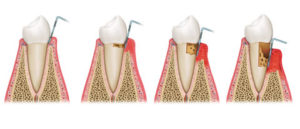Maintaining A Healthy Weight For Better Oral Health
Diet and lifestyle choices that contribute to obesity can also negatively impact your teeth and gums
 Some of you may have seen a recent report suggesting that obesity increases the chances of dying from Covid-19 by 48%. Whilst this is headline making news, it has been known for some time that obesity poses a serious problem for our health more generally.
Some of you may have seen a recent report suggesting that obesity increases the chances of dying from Covid-19 by 48%. Whilst this is headline making news, it has been known for some time that obesity poses a serious problem for our health more generally.
Linked with many medical issues, including heart disease and diabetes, there are strong arguments for a national strategy to reduce the extent of this problem.
What has largely been less well publicised is the harm that being overweight can do to your teeth and gums. Although any damage here may seem less serious than the heart for example, the reality is that teeth and gums that are in poor health can dramatically reduce the quality of life for people in this situation.
Diet
Anyone who has been around for more than 20 or 30 years will have seen a real change in the way that we eat. Although sweet and sugary foods were eaten years ago, the quantities and the way they are eaten have certainly changed a lot. Whereas cakes or puddings were eaten after a meal, this type of food is now widely available in the high streets. Add to that chocolate bars and sweets that are much more heavily advertised on TV, and there is little wonder that there is an obesity problem.
The same applies to our meals in general. In days gone by, we would have eaten three meals a day, with the vast majority of these being home made. Nowadays, we tend to ‘graze’ throughout the day, not allowing the enamel on our teeth to recover. In addition to this, many ready made meals are much higher in sugar than you would expect, even savoury foods.
Problems arising from obesity that affect oral health
There are two main areas where this applies. The first is in the sugar in our diets and the second in the increased risk of diabetes. We will discuss this shortly.
We don’t really need to tell our Canterbury patients why eating too much sugar is bad for our teeth and gums. Bacteria feeding on the sugar in our mouths produce acids which damage the enamel on our teeth, leading to tooth decay and gum problems.
It is worth noting that our lifestyles also can contribute to our being overweight. A lack of exercise combined with a poor diet will worsen the situation. With lack of exercise, we are likely to have a poorer blood flow, meaning that infections, including gum disease, are more likely. Healing can also be much slower.
Diabetes
At Bradley and Partners Dental and Implant Clinic, we have long recognised the problems that diabetes can cause for our Canterbury dental patients. There are many medical issues associated with this widespread disease, but as dentists, we are primarily concerned with the role it plays in increasing the likelihood of gum disease.
You may have seen toothpaste adverts where someone spits blood after brushing their teeth. What these adverts rarely show though is the sore and inflamed gums that it can cause, along with the very smelly breath! If ignored and left untreated, it can even lead to tooth loss as periodontitis damages the supporting bone in the jaw, causing the teeth to become loose and eventually sometimes falling out.
Because of a reduction in the ability to fight diseases, the increased likelihood of a dry mouth and having excess sugar in their saliva, diabetics need to be particularly careful to have appropriate dental supervision and monitoring. Whereas we generally recommend that patients see a hygienist for a scale and polish every six months, we recommend that this is done more frequently if you suffer from diabetes. This gives your mouth a better chance of remaining healthy and free of significant gum problems.
A change of habits
Although some medical conditions can lead to obesity, the reality is that much of it is caused by diet and lack of exercise. The good news is that it is never too late to do something about this, even if you are heavily overweight now. There is no need to join a gym or ‘pump iron’ to get fitter. Simply try walking a little more each day and, instead of taking a lift or elevator, try to walk up the stairs. You could also get off a bus one stop earlier and walk the extra distance. These are small changes that most of us can make and then progress to more extensive exercise as we feel capable.
The same applies to food. If you are used to eating lots of cakes and puddings, there is no need to go straight to a ‘carrot and quinoa’ diet. Just try to cut down a little, either by replacing some of your puddings with fruit or even reducing your portions. A slow and gradual change is more likely to be longer lasting than a dramatic (and often unsustainable) change to your normal routine.
Whatever your lifestyle and level of health, you still need to see a dentist regularly. Although a ‘perfect’ lifestyle and diet will certainly help you to avoid many dental issues, it doesn’t mean that you will necessarily escape them entirely. Do make sure that you are registered at a dentist and if you live in the Canterbury area, the Bradley and Partners Dental and Implant Clinic will be happy to help. You can call us on 01227 463529.
